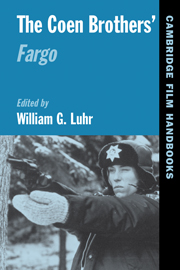Book contents
- Frontmatter
- Contents
- Acknowledgments
- Contributors
- 1 Introduction
- 2 Fargo in Context: The Middle of Nowhere?
- 3 Motherhood, Homicide, and Swedish Meatballs: The Quiet Triumph of the Maternal in Fargo
- 4 Fargo, or the Blank Frontier
- 5 ‘Kinda Funny Lookin’”: Steve Buscemi's Disorderly Body
- 6 Fargo: “Far Removed from the Stereotypes of …”
- 7 Closer to the Life Than the Conventions of Cinema: Interview with the Coen Brothers (conducted in Cannes on May 16, 1996)
- 8 Cold-Blooded Scheming: Roger Deakins and Fargo
- 9 Carter Burwell in Conversation: Music for the Films of Joel and Ethan Coen
- 10 Review of Fargo
- 11 Prairie Home Death Trip
- Filmography of Joel and Ethan Coen
- Selected Bibliography
- Index
9 - Carter Burwell in Conversation: Music for the Films of Joel and Ethan Coen
Published online by Cambridge University Press: 07 December 2009
- Frontmatter
- Contents
- Acknowledgments
- Contributors
- 1 Introduction
- 2 Fargo in Context: The Middle of Nowhere?
- 3 Motherhood, Homicide, and Swedish Meatballs: The Quiet Triumph of the Maternal in Fargo
- 4 Fargo, or the Blank Frontier
- 5 ‘Kinda Funny Lookin’”: Steve Buscemi's Disorderly Body
- 6 Fargo: “Far Removed from the Stereotypes of …”
- 7 Closer to the Life Than the Conventions of Cinema: Interview with the Coen Brothers (conducted in Cannes on May 16, 1996)
- 8 Cold-Blooded Scheming: Roger Deakins and Fargo
- 9 Carter Burwell in Conversation: Music for the Films of Joel and Ethan Coen
- 10 Review of Fargo
- 11 Prairie Home Death Trip
- Filmography of Joel and Ethan Coen
- Selected Bibliography
- Index
Summary
The relationship between composer Carter Burwell and writer/directors Joel & Ethan Coen is rare. Burwell's music – chameleon-like, eclectic, unexpected – perfectly matches the many genre-betiding excursions of the Coens' projects. Often working at a meta-textual level, the Coens' films are acutely aware of an audience being conscious of the story-telling manipulations that drive contemporary cinema. To this end, the Coens' use of Burwell's music always seeks ways to sidestep conventional methods of “emotionally cueing” an audience with snippets of mood music. Burwell's prime eclecticism lies in a strange mismatching whereby his cues at first appear to “not fit” – but eventually reveal a depth that is rooted in the complex story-telling craft of the Coens' narratives.
THE PROCESS OF FILM COMPOSING
I've known Joel and Ethan Coen for a long time. Their first film was my first film. It's that simple. Their films are good for discussing the types of choices a film composer has to make, and they range over a wide variety of musical genres. For people who are not very familiar with film scoring, let me go through a little of the process involved.
First, Joel and Ethan write a script and give it to me. We'll talk about what type of music might be appropriate, a conversation which continues through the shooting process. I usually go and watch some of the shoot – partly to see what visual environment is involved. I don't really start writing until they finish shooting.
- Type
- Chapter
- Information
- The Coen Brothers' Fargo , pp. 128 - 136Publisher: Cambridge University PressPrint publication year: 2003



